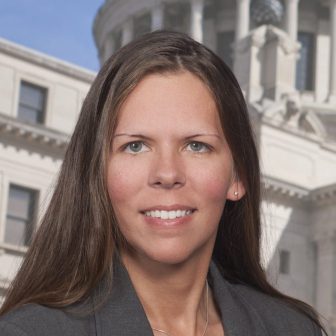
Former Mississippi Gov. Phil Bryant instructed his wife’s friend — whose nonprofit was receiving millions in subgrants from the welfare department he oversaw — to pay NFL legend Brett Favre $1.1 million, according to a new court filing.
Nancy New alleges Bryant directed this and other spending, resulting in a massive scandal and what officials have called the largest public embezzlement scheme in state history.
Nancy New, a friend of former First Lady Deborah Bryant, and her son Zach New have pleaded guilty to several criminal charges, including bribery and fraud. As part of their plea, a favorable deal which guarantees they will spend no time in state prison, the News have agreed to cooperate in an ongoing criminal investigation.
The Mississippi Department of Human Services is also suing Nancy New civilly, asking the court to make her repay $19.4 million. The department alleges New and 37 other defendants, including Favre, violated federal rules when they spent or received money from a federal block grant called Temporary Assistance for Needy Families.
But Bryant, who had the statutory oversight responsibility over the department’s spending, has remained insulated from official liability. Mississippi Today, in its investigative series “The Backchannel,” first reported the former governor’s role in the scandal based on a trove of text messages between Bryant, Favre and other key defendants in the case.
New’s filing marks the first time Bryant has been directly, publicly accused of wrongdoing by main defendants in the case.
“Defendant reasonably relied on then-Governor Phil Bryant, acting within his broad statutory authority as chief executive of the State, including authority over MDHS and TANF, and his extensive knowledge of Permissible TANF Expenditures from 12 years as State Auditor, four years as Lieutenant Governor, and a number of years as Governor leading up to and including the relevant time period,” reads New’s response to the MDHS civil complaint filed Monday.
New rejected the notion officials have made throughout the three-year investigation that John Davis, Bryant’s appointed welfare agency director who is also facing criminal charges, was a rogue state bureaucrat who independently chose to misspend tens of millions of welfare dollars.
The bombshell response from Nancy New, her sons Zach New and Jess New and her nonprofit Mississippi Community Education Center, who are also defendants in the civil suit, argue that MDHS is more at fault than it has represented. The court filings name dozens of officials and state employees who acted alongside Davis to perpetuate the scheme — with Bryant named first in the list.
Bryant’s spokesperson Denton Gibbes denied New’s assertion. “She’s pointing her finger at everybody but the Easter Bunny,” Gibbes told Mississippi Today. “This is just legal hogwash.”
THE BACKCHANNEL: Phil Bryant had his sights on a payout as welfare funds flowed to Brett Favre
Bryant and the dozens of other state actors are referenced in the filing as “MDHS Executives.” New’s answer also claims that Davis and MDHS Executives directed her “to provide $5 million on behalf of the State of Mississippi to Prevacus, Inc. during a meeting with Jake Vanlandingham at Brett Favre’s home.”
The News ended up paying Prevacus, an experimental concussion drug company, and its affiliate PreSolMD a total of $2.1 million — payments that were pivotal to the criminal investigation and charges against the News.
In his last year as governor, Bryant was heavily involved in discussions about luring Prevacus to Mississippi, specifically to a new development called Tradition that Bryant had touted. Bryant helped the company find investors, make political connections and he even agreed to accept stock in Prevacus in January of 2020, Mississippi Today first reported in its investigative series, “The Backchannel.” His deal with Prevacus was derailed when agents from the state auditor’s office made arrests shortly after.
The News’ recent filings are the first to reveal that state officials and employees actually intended to pay Prevacus $5 million through the nonprofit. The filing does not specifically say which “MDHS Executives” directed this investment.
Mississippi Community Education Center is also countersuing MDHS, claiming that the welfare agency breached their contract. The nonprofit asks that if it is required to pay back any of the funds as a result of the civil suit, it should be able to recoup the same amount back from MDHS, plus other relief.
An additional motion to stay discovery in the case asks the court to allow Nancy and Zach New to wait until their criminal cases have concluded before complying with discovery in the civil suit. Their April plea agreement suggests that investigators may have their sights on other co-conspirators that the News will be expected to help officials prosecute.
In the News’ motion to stay, their attorney finds several faults with MDHS’s allegations.
Primarily, the News argue that TANF rules have always allowed states to spend the block grant in a variety of ways, including on programs that serve people who earn up to 350% of the poverty line, which is currently $97,125. The state has even boasted in its official state plans about how it has taken advantage of the flexibility of TANF dollars.
Only now, the News argue, after many of these “absurd expenditures” have come to public light, has the state revised its interpretation of the TANF statute to be more narrowly tailored to activities that actually help the poor.
“MDHS has had a 25-year love affair with TANF’s extreme flexibility. MDHS cannot now divest itself of its contractual obligations simply because it is politically and financially expedient to do so,” the motion reads.
The News have been targeted by investigators and law enforcement, the filings argues, without holding others who perpetuated this pattern of spending accountable.
“The New Defendants will be substantially and irreparably harmed if forced to participate in discovery amidst giants poised for what promises to be a no-holds-barred death match,” the motion reads. “…The New Defendants have taken responsibility for their roles, yet they continue to be thrust into the crossfire by powerful forces fighting over political futures and tens of millions of dollars. The State wants to avoid liability and embarrassment, the Feds want their money back, and the public wants answers.”
Read the entire motion below.
The post Gov. Phil Bryant directed $1.1 million welfare payment to Brett Favre, defendant says appeared first on Mississippi Today.






























